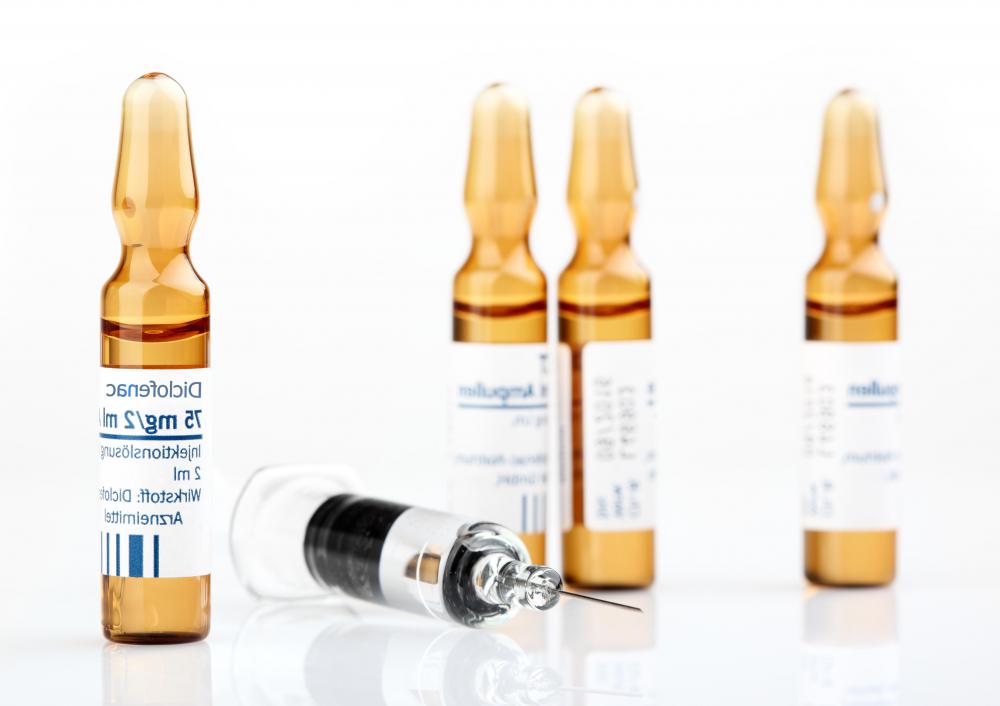At WiseGEEK, we're committed to delivering accurate, trustworthy information. Our expert-authored content is rigorously fact-checked and sourced from credible authorities. Discover how we uphold the highest standards in providing you with reliable knowledge.
What Is Diclofenac?
Diclofenac is a member of a group of medications known as nonsteroidal anti-inflammatory drugs (NSAIDs). Analgesic and anti-inflammatory properties mean that diclofenac is used to relieve pain and reduce swelling and inflammation caused by a wide variety of illnesses and injuries. Available most commonly as a tablet, an oral solution, or a topically applied gel, diclofenac is a widely prescribed analgesic. Like all medicines, it does carry the risk of some side effects that patients should be aware of as well as contraindications for taking this drug with a number of others or if there are certain preexisting medical conditions.
Similar to a number of other NSAIDs, diclofenac is a cyclooxygenase (COX) inhibitor. Cyclooxygenase is a naturally occurring chemical that automatically produces a number of other substances in response to injury of illness. These substances cause pain and inflammation at the site of the problem. By preventing cyclooxygenase from completing the production of these response chemicals, diclofenac reduces pain and inflammation.

In tablet form, this medication is used as an anti-inflammatory and analgesic for a wide variety of ailments including muscular and tendon injuries, severe menstrual cramps, soft tissue infections, back pain, sciatica, and arthritic conditions. It is also a popular choice in post-operative pain management because of the cyclooxygenase inhibiting qualities. Health care providers often recommend oral diclofenac for treating painful or swollen joints and conditions such as carpal tunnel syndrome.

Diclofenac gel is most commonly used to relieve pain and inflammation at a localized injury site. It is particularly useful in treating muscular pain. Often recommended for sports injuries such as strains, sprains, and torn muscles, diclofenac gel can be applied directly to the skin, where it is absorbed and begins to bring relief quickly. Even though it is applied topically in gel form, it is still absorbed into the body. Therefore, the same precautions should be taken as when using diclofenac oral forms.

No other NSAIDs, such as ibuprofen, mefenamic acid, or aspirin, should be taken while using this medication. A number of herbal pain relieving and anti-inflammatory remedies must also be avoided, especially white willow bark, in either tea, ointment, or tablet form. Combining diclofenac with other NSAIDs or certain herbal remedies can have very serious or even life threatening consequences.

Common mild side effects can include stomach cramps, headaches, nausea, and diarrhea. If these symptoms persist or become particularly severe, it is advisable to speak to a medical professional. This medication is not recommended for those with gastrointestinal, cardiac, respiratory, kidney, or liver disorders because it can worsen a preexisting condition and cause severe complications.
As an NSAID, diclofenac can cause significant respiratory problems such as wheezing, difficulty breathing, or in rare cases anaphylaxis. In asthmatic patients, the risk of respiratory distress or increased asthma attacks is greatly increased. If any respiratory problems or signs of anaphylaxis — such as a swollen face, lip, tongue, or throat — arise while taking this medication, immediate medical attention should be sought.
AS FEATURED ON:
AS FEATURED ON:














Discuss this Article
Post your comments